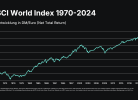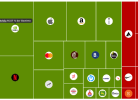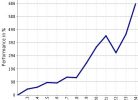By MITCH ZACKS
Frantic, non-stop negative headlines make it seem like the apocalypse is not only coming…but that it’s already here. I can assure you, it is not.
Monday’s trading action across the equity, bond, and commodities markets sent shockwaves around the world. The S&P 500 fell -7.6% in a single trading session – the biggest decline since 2008 – and oil prices notched their biggest one-day drop since the start of the Gulf War in 1991. Stocks posted a strong rebound on Wednesday only to dive -9.51% on Thursday. The yield on the benchmark US 10-year Treasury briefly touched an all-time low of 0.318% in overnight trading early in the week, though it settled higher later in the week. The 10-year was above 1.5% as recently as mid-February.
Even as I write this weekly column, I have no idea how the markets will trade hour by hour or day by day, but these short-term trends have never been a focus or affected my long-term investing approach. The heart of the matter is that the day-to-day volatility is just that – volatility. In my view, volatility is just day-to-day noise, driven by technicals, that rarely have to do with fundamental investing themes. I don’t think this time is any different.
My advice has always been – and continues to be – to tune out the noise, look beyond the headlines, and stay the course when others flee. The markets can be volatile, it’s par for the course. In my opinion, investing with discipline, maintaining perspective, and remaining calm in times of distress are the keys to long-term investing success.
The market has always experienced panics, like the oil crisis in 1979, Black Monday in 1987, the Asian Crisis of 1998, the Dot-Com crash of 2000, and most recently the financial crisis of 2008. Many readers may remember Black Monday, when the Dow Jones fell -22.6% in a single day!3 People were convinced it was the end of the stock market and that an economic depression was nigh.
But it wasn’t the end, and there was no depression. In fact, the market finished positive in 1987, and it wasn’t long before the 1990’s boom ushered in some of the best returns for stocks, ever. The key investors can learn from this event is not to give in to the fear that frequently blankets the equity markets. This fear – and the media hysteria that almost always accompanies it – causes investors to make investment decisions based not on data and fundamentals, but on emotion and technical trading.
Fear leads to short-term market timing decisions, which I’ve learned over and over is the surest way to damage long-term returns.
My point here is that I’ve seen my fair share of panics and sharp selloffs and even virus outbreaks over the years and decades. In my early days, I would wonder if the market and the economy could really withstand some of these shocks, or if maybe it would be better to play it safe and wait on the sidelines for bluer skies. In my later years (these days), I can look at what’s happening and remember that the market and economy recovered every single time, oftentimes more quickly—and strongly—than anyone expected. I can remember that the best investment decision was often to do nothing at all, assuming I had already used a rigorous and time-tested process to build and manage a diversified portfolio with quality companies. That’s why I feel confident right now, not fearful.
So, instead of panicking and falling in line with doom-and-gloom scenarios and predictions, I think investors should take a deep breath and ask some questions:
# By summer and fall, will everyone still be talking about the coronavirus outbreak and an oil price war between the Saudis and Russia? Or are these just two events in a passing moment in time?
# Are record low interest rates good for the economy or bad for the economy?
# Would lower energy prices be good for US consumers and the economy or bad for US consumers and the economy?
# Before the coronavirus outbreak, was the US on a solid growth path with modest inflation and strong job growth? Can the US economy recover from the current supply disruption and get back to growth?
# Are US banks in strong financial positions with steady loan activity and cash-rich balance sheets?
When the ‘dust settles’ on the current crisis, are we going to be left with record-low mortgage rates, interest rates, low energy prices, job growth, and attractively-priced stocks?
# Has the global economy recovered from previous virus outbreaks and pandemics?
# Has the global stock market recovered from previous virus outbreaks and pandemics?
# Have you or anyone you know lost their job because of the coronavirus outbreak?
Answering these questions won’t tell us when downside market volatility will end – only that it will end, in my view. Fear and panic need to be ignored as much as humanly possible in order to invest successfully. Continue to focus on the long-term, and I think you’ll have a much higher chance of realizing the long-term investment outcomes you desire.
Bottom Line for Investors
In early February, I wrote a column titled, “4 Reasons Markets Will be Volatile This Year.” Here’s an excerpt:
“I think volatility is a good thing – it’s a normal, natural part of equity investing, and experiencing volatility from time to time means the market is functioning rationally, in my view. It is also important for investors to remember that volatility works both ways – delivering blows to the downside and triumphs to the upside over short periods of time.
When volatility happens, I think it’s almost always best to stay patient and let the volatility run its course. My advice in 2020 will almost certainly be no different.”
Volatility – and my advice to stay patient – is here now. I had no idea that volatility would accompany a virus outbreak and an oil price standoff, but my decades of experience taught me that it was only a matter of time before something happened to trigger wild swings in the market. The triggering event is almost always unexpected and unpredictable, and I suspect this current bout of volatility will last weeks or even months.
With each passing year of investment experience, it is easier to see why the four most dangerous words in investing are “it’s different this time.” If you’ve ever believed ‘this time is different,’ history has always proven you wrong. Keep a cool head, and I think you’ll be right.
Wenn du keinen Beitrag mehr verpassen willst, dann bestell doch einfach den Newsletter! So wirst du jedes Mal informiert, wenn ein neuer Beitrag erscheint!








Hallo,
nachdem ich seit 1977 all die genannten Krisen live erlebt habe (und zuletzt im Dez. 2019 abgebaut habe), stimme ich mit der Grund-Botschaft dieses Artikels überein: „Die Finanz-Welt“ wird sich weiterdrehen.
ABER: Bei mir stehen Risiko und Chance im Mittelpunkt der Analyse und bei Kursen, die in kürzester Zeit um rd. 30% gedrückt sind, gibt es m.E. bereits Einzel-Aktien, bei denen das Chance/Risiko-Verhältnis (90:10) beträgt.
Ergo: die Watchlist wurde aktualisiert und letzte Woche und nächste Woche bis zum Verfalltag, Freitag, 20.3.2020, gehe ich Aktien shoppen.
Viel Glück
FoxSr
Ich war schon shoppen. Und ich shoppen auch gerne noch einmal – wenn es weiter runter geht.
„Are US banks in strong financial positions with steady loan activity and cash-rich balance sheets?“
Sollte man sich diese Frage nicht auch bei den europäischen Banken stellen?
„Have you or anyone you know lost their job because of the coronavirus outbreak?“
Ja leider, ich kenne einige.
Ich kenne in der Tat niemanden. Kann aber noch kommen. Die realwirtschaftlichen Auswirkungen von Corona sind noch immer sehr überschaubar. Noch. Auch das kann sich ändern. Dazu müssen allerdings drei Akteure drei schwere Fehler machen. Was niemals auszuschließen ist.